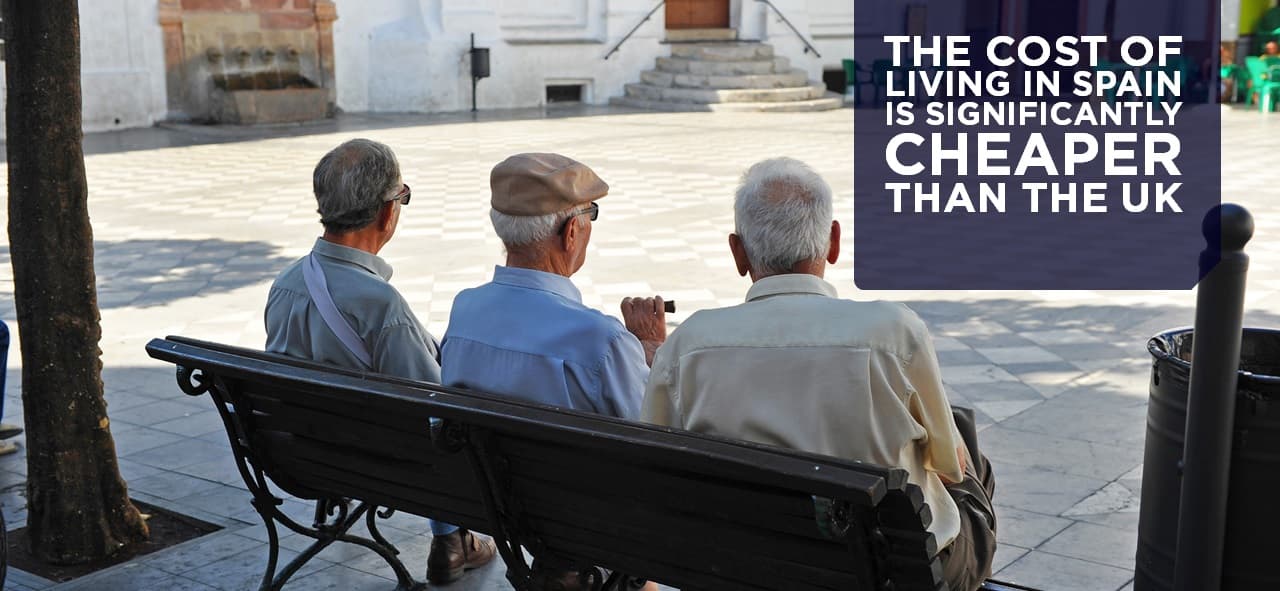- Home
- Blog
- Relocating
- How to Make the Most of Your Spanish Retirement

How to Make the Most of Your Spanish Retirement
١٥ فبراير ٢٠١٦ — 8 min read
Spain has become one of the most popular destinations for British expats to take up retirement. The fantastic weather, relaxed way of life, and short flight time back to the UK if needed are just a few of the reasons why this country is so appealing. The quality of life on offer means that retirees are flocking to the Spanish southern coast in their thousands, where areas such as the Costa Del Sol and Costa Brava are the top hotspots.
While the UK is part of the EU, it remains relatively easy to retire to Spain. The situation may change in future as a result of Brexit, but these changes should not take place until after the UK has completed the negotiation process. So for now, it is possible to make the move in the same way as before the EU referendum vote, although it is unclear what Brexit could mean for expats in future.
We’ve taken a look at just what is so appealing about retiring to Spain compared to the UK, and the important things to consider before making the move out there.
Things to consider before making the move
Pensions and Visas
There are many things you need to consider before you definitely decide to bite the bullet and move to Spain to enjoy your retirement. First things first, an international person needs an international pension. A Qualifying Recognised Overseas Pension Scheme (QROPS) is an overseas pension scheme that meets certain requirements set by HMRC, and can receive transfers of UK Pension Benefits without incurring an unauthorised payment and scheme sanction charge. Further benefits for expats using a QROPS include more flexible choices on retirement, such as the ability to take up to 30% of your pension as a lump sum. They also allow your pension to grow free of tax on dividends, have the ability to provide much more for your spouse in the event of your death, and have an improved inheritance tax situation.
EU residents who wish to live in Spain as a retiree also must have a Retirement Visa. Before travelling, you will need to obtain an EU form E-121, which will entitle you to healthcare in Spain, providing you have paid all relevant social security back in the UK. In order to gain a Retirement Visa, you will also have to provide a certificate from a private or public institution which proves you will be receiving a regular pension, together with the details of that pension. You will also have to provide proof of any other sources of income that you have, alongside proof of ownership of any property in Spain that you own.
Healthcare
Before retiring to Spain, it is also extremely important to plan for your old age whilst you are still fit and well, which means considering any healthcare you may need whilst you live there. 40% of hospitals belong to the Spanish National Health (System Sistema Nacional de Salud – SNS), and the rest are privately owned. In most towns and cities, the number of doctors is around 4.9 per 1,000 according to World Health Organisation figures. In comparison, the UK has around 2.8 per 1,000. Public healthcare is offered on a contribution based system, which means you have to pay into the social security system (seguridad social) in order to have access to free healthcare. Although this system is extremely well regarded, many expats opt for private insurance to avoid long waits for appointments.
If the time ever comes that you or your family have to go into a nursing home, it is worth noting that EU citizens who live in Spain are entitled to apply for entry to Spanish state homes. However, the places are limited, even for Spanish pensioners, and you will need to contribute towards the fees. Private nursing homes provide various levels or treatment, but expect to pay between €2,000 – 5,000 per month for 24 hour care.
Finances
After considering all of these things, it is also important to check that you are in fact in the right financial situation to emigrate. Research has shown that the average person needs £600,000 in their pension for a comfortable retirement. As an expat, there are likely to be additional expenditures that you need to plan for, such as money for trips home and things such as medical insurance, which we have already discussed. Changes in exchange rates could also affect your financial situation, so it is important to make sure that you are not going to be caught short.
Many expats who have retired to Spain actually do find ways to make a bit of extra money in their spare time. For example, many British people own holiday homes in Spain, which they rent out whilst they aren’t there. Often these people request the help of expat retirees to oversee their holiday homes, from cleaning it for a couple of hours a week and even taking holiday goers to and from the airport. Some expats have set up classes for British people such as creative writing, which they can enjoy whilst being on holiday. Often, expats actually work part time in their old profession for the rest of the British community who live out in Spain, particularly as beauticians, hairdressers, and even decorators on a small scale.
How much does it cost to retire to Spain?
The cost of living in Spain is significantly cheaper than the UK, which is just one of the reasons that it is such a popular retirement choice for expats. Numbeo, the world’s largest database about cities and countries worldwide, has compared data from the UK and Spain, which shows that things such as accommodation, food, clothes, leisure, utilities, transport and education cost a lot less in Spain.
Accommodation
If you do decide to take up retirement in Spain, chances are you will need somewhere to live. The good news is that property is much less expensive, whether you decide to rent, buy, or a mixture of both. We’ve taken a look at some of the statistics that highlight just how cheap Spain is compared to the UK when it comes to accommodation, both in cities such as Barcelona and Malaga, and the more rural locations:
Average rent per month **Spain**UK**Difference Apartment (3 bedrooms) in City Centre€876 (£750)1 £1,207+61%Apartment (3 bedrooms) outside of City Centre€624 (£534)1 £949+78%Average cost to buy an apartment Price per square meter in City Centre€2,558 (£2,192)1 £3,571+63%Price per square metre outside of City Centre€1,662 (£1,424)1 £2,935+106%
Food and Drink **
Obviously accommodation costs play a huge part in deciding where to retire. But it’s not just property that is cheaper in Spain by a substantial amount. For example, a three course meal for two people at a mid-range restaurant would only cost approximately €40 in Spain, whilst in the UK this would average out at £45 (€53)1, a third more.
Retired people may also be more likely to go out for a leisurely coffee whilst catching up with friends. If you live in Spain, a regular Cappuccino will cost €1.56, whereas if you stayed in the UK it would set you back £2.48 (€2.89)1. When it comes to doing a regular supermarket shop, out of 16 criteria the UK is only cheaper on one thing, local cheese. In fact, the biggest price difference is water, which you would pay on average 43 pence for in Spain, compared to 93 pence in the UK.
Lifestyle Changes
Alongside the cheaper prices across the board when it comes to living costs in Spain, the lifestyle changes that will naturally happen when you move there to retire are likely to mean you will spend a lot less money on a day to day basis. The excellent weather and general laid back Spanish way of life play a big part in this. If you are stuck for things to do whilst in the UK, it normally results in a trip to the cinema, shopping, or some form of leisurely activity that ends up costing money. In contrast, living in Spain could mean you are more inclined to spend days at the beach, going on walks or generally exploring the area. Rather than going out for expensive meals, evenings can be spent having barbecues and eating outdoors at your own home.
To summarise – remember to look at this checklist to make sure you have planned for everything before moving to Spain:
QROPS Pension
Retirement Visa
State or private healthcare scheme
Personal finance
Accommodation
And if you do decide to make the big move to Spain to enjoy your retirement, or know people who have already done it, don’t forget that Xe could help you save money on your international money transfers.
The information, materials, accompanying literature and documentation available on our internet site is for information purposes only and is not intended as a solicitation for funds or a recommendation to trade. Xe its officers, employees and representatives accept no liability whatsoever for any loss or damages suffered through any act or omission taken as a result of reading or interpreting any of the above information.
While we take reasonable care to keep the information on the website accurate and up to date, there may be occasions when this is not possible. Case Studies and articles are not intended to predict future moves in exchange rates or constitute advice.
Xe makes no representations, warranties, or assurances as to the accuracy or completeness of any information derived from third party sources. If you are in any doubt as to the suitability of any foreign exchange product that you are intending to purchase from Xe, we recommend that you seek independent financial advice first.
For more information about XE, please click here: Regulatory Information
Related Posts

٢٨ يونيو ٢٠٢١ — 7 min read

١٧ يونيو ٢٠٢١ — 8 min read

٢٥ مايو ٢٠٢١ — 9 min read

١٨ ديسمبر ٢٠٢٠ — 8 min read

٥ نوفمبر ٢٠٢٠ — 8 min read

٣ نوفمبر ٢٠٢٠ — 14 min read